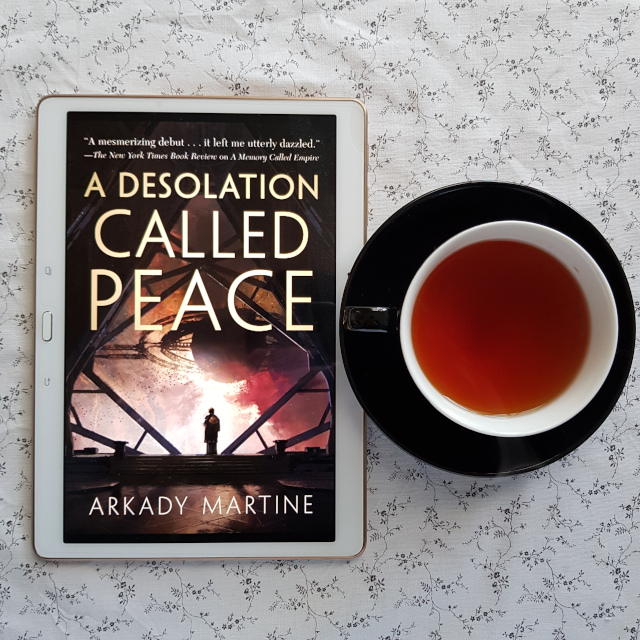
Arkady Martine’s novel, A Memory Called Empire, was a stunning debut, offering up a richly imagined world and digging into themes of identity and colonialism with sensitivity and nuance. A Desolation Called Peace meets the high bar set by its predecessor, developing the world and existing relationships with the same eye for nuance, as well as breaking new ground.
Having rescued Lsel Station from the threat of the Teixcalaan Empire (at least for the time being), Ambassador Mahit Dzmare returns home to find she’s in even more hot water there. Fortunately, she’s saved (again, at least for the time being) by the wheels that she set in motion. The new Emperor has sent out a fleet to investigate Mahit’s report of a ravenous alien race not far from Lsel Station. When the fleet captain puts out a call for a diplomat and linguist to make first contact, Three Seagrass answers, collecting Mahit along the way.
There is so much to be delighted by in this book. I was thrilled to have Mahit and Three Seagrass reunited and particularly by the difficulties of their relationship. The story acknowledges the way these characters haven’t known each other for very long and most of that time involved intense events. While in some ways they know each other intimately, in others they don’t know each other at all. This tension permeates their interactions. It is equalised somewhat by Three Seagrass stepping out of her comfort zone and leaving the Jewel of the World, the capital of Teixcalaan. But on board a Teixcalaan vessel, she’s still in Empire territory and the balance of power between these characters remains very unequal. While Mahit is still officially the Ambassador of Lsel Station, there is no call for her to act in that capacity and the military only suffer her presence because she is there at the behest of Special Envoy Three Seagrass. As a non-citizen, Mahit is not entitled to wear the eyehooks so ubiquitous to the Empire. If Three Seagrass storms off in a huff, Mahit is left unable to navigate the ship or even do something as simple as open a door, leaving her literally lost and helpless. Although Mahit and Three Seagrass have missed each other during their time apart, this has not magically erased the colonialist tensions in their relationship.
We also get some new perspective characters. The Fleet Captain Nine Hibiscus enables the reader to get a good grasp of the military situation — not only of the conflict with the aliens, but also of the schisms within the fleet. After all, what is the Empire without politics? However, the author is also savvy enough to give Nine Hibiscus her own emotional stakes. The deliciously understated relationship between the Fleet Captain and her second-in-command subtly echoes some of the dynamics of the relationship between Three Seagrass and Mahit, while also highlighting some differences. Nine Hibiscus and Three Seagrass embody idealised types of Teixcalaans: the war general and the poet. In contrast, Mahit and Twenty Cicada are outsiders, with Twenty Cicada practicing a minority religion and Mahit being a non-citizen. The difference is that despite Twenty Cicada’s otherness, he remains part of the Empire. He is a strange Teixcalaan, but he’s still a Teixcalaan. Thus, he is permitted to wear an eyehook, serve in the military, and make himself an ubiquitous and useful presence in a way that Mahit never can. His decades long, apparently non-sexual relationship with Nine Hibiscus also provides a strong contrast to the central relationship.
Another significant and new perspective character is the Imperial Heir Eight Antidote. He was introduced in the previous book as the clone of Emperor Six Direction. Now approaching his teens, he takes his place on the Empire’s stage. And, as I said before, what is the Empire without politics? Eight Antidote finds himself being manipulated and begins to learn the art of manipulation in turn. He’s a surprisingly sweet character, with an earnestness that’s endearing and makes an excellent foil to his intelligence. It’s unclear at this stage whether there will be any further books in this series (I’ve got my fingers crossed), but if there is, including Eight Antidote in this book is a brilliant stroke. Seeing him as a perspective character when he’s so relatively innocent has made me feel attached to him, reinforcing an emotional connection to the Empire he will one day inherit.
And lastly, we get to the aliens themselves. Parts of the book put me in mind of the movie Arrival. It is, after all, a first contact story with truly alien aliens, creatures who communicate in such a different way to humans but who undeniably communicate. And there’s a time pressure from the military to get things figured out before they come in with guns blazing. This association also amuses me, since Teixcaan itself is a culture of references, with a literary quote for all occasions.
The exact nature of the aliens brought to mind many other (largely recent) texts, which shall remain nameless for the time being to avoid spoilers. This disappointed me at first, since it is becoming well-trodden ground (if it isn’t already so). However, the ending brought a new approach that was satisfyingly original.
While I could go on (and already have at length without even touching on the secrets or space cats), suffice it to say A Desolation Called Peace is an intelligent, engaging book that does a fantastic job of building on what came before. I can only hope there’s more to come.
Published: March 2021 by Tor Books
Format reviewed: E-book (mobi), 496 pages
Series: Teixcalaan #2
Genres: Science fiction, space opera
Source: NetGalley
Available: Abbey’s ~ Amazon (AU, CA, UK, US) ~ Barnes & Noble ~ Book Depository ~ Booktopia ~ Dymocks ~ Kobo
Disclaimer: I was provided with a free copy of this book in exchange for an honest review.
